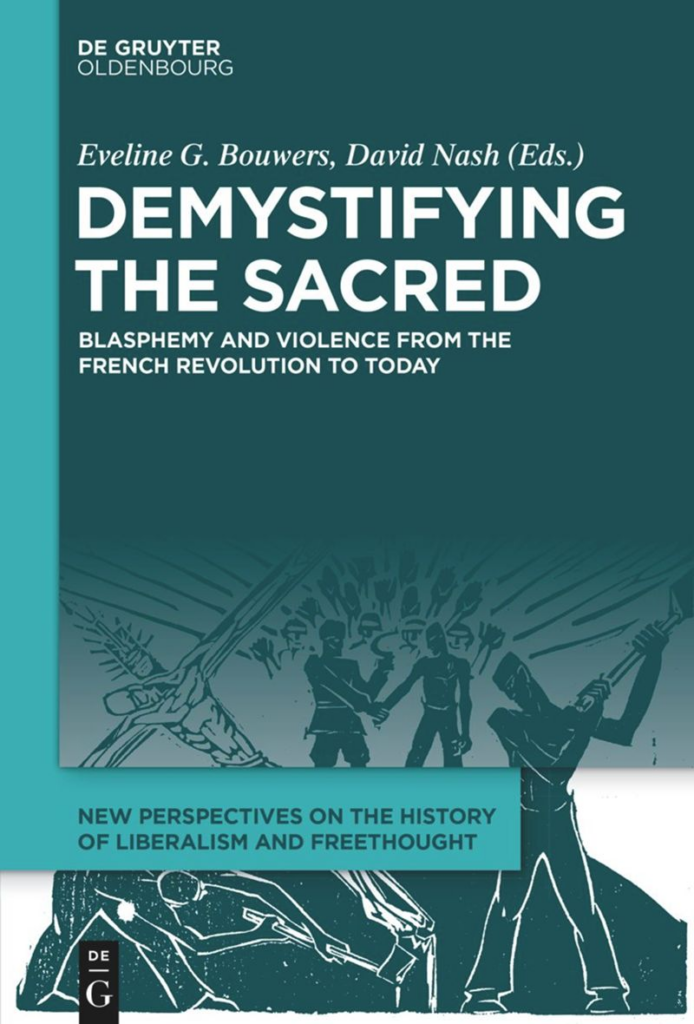
Books sometimes have a way of turning up at opportune times. In mid-2022 a collection of essays on the themes of blasphemy and violence in Europe, Demystifying the Sacred: Blasphemy and Violence from the French Revolution to Today, went off to the printers. According to the publisher, De Gruyter, the book ‘offers a much-needed analysis of a subject that historians have largely ignored, yet that has considerable relevance for today’s world: the powerful connection that exists between offences against the sacred and different forms of violence.’
‘Considerable relevance’ would shortly prove a massive understatement. On 12 August 2022, a month before the book’s publication, author Sir Salman Rushdie was savagely attacked as he was preparing to deliver a lecture in New York. Repeatedly stabbed, Rushie only narrowly survived, although he has lost sight in one eye. A New Jersey man of Lebanese background, Hadi Matar, is currently awaiting trial for attempted murder. All the facts will come out then, but from what we know, it is safe to say the attack was a violent response to blasphemy.
Rushdie has been living with the threat of such an attack since Valentine’s Day 1989, when the ailing Iranian theocrat Ayatollah Ruhollah Khomeini proclaimed that his novel The Satanic Verses was ‘a text written, edited, and published against Islam’ and its author deserved death. This fatwa still stood in 2022, although amidst the tumult of COVID-19, the 2020 United States presidential election, and the Russian invasion of Ukraine it was hardly front of mind for most people. The attack on Rushdie reminded us that, whatever else is happening in the world, the threat of zealous violence against those who fail to treat the sacred with the level of reverence the zealots consider to be its due has not gone away. The fatwa still stands today.
Demystifying the Sacred is an academic work, or a collection of academic works, exploring the connection between blasphemy and violence in Europe over the last two and a half centuries. Each chapter has a theme, usually a particular time and place. For example, one essay by Julio de la Cueva looks at blasphemy and violence in the Spanish Civil War. David Nash, one of the book’s editors (the other is Eveline G. Bouwers), contributes a chapter on blasphemy in English law, in which early editions of the Freethinker make an appearance. The final chapter, by Manfred Sing, covers the Rushdie affair.
A Conceptual Chameleon
‘Words are not violence’ is a long-running catchcry of the defenders of free speech. There are those, like Khomeini, who disagree, and Demystifying the Sacred can give some insight into their thinking. To them, blasphemy itself is violence, and blasphemers are themselves the instigators. The book does not just deal with violence against people, but violence against property. It starts, in fact, with the vandalism of an artwork.
It’s easy to assume that a book on blasphemy and violence will tell the story of the struggle against book-burning fanatics by the advocates of tolerance, reason, and Enlightenment. But the themes of Demystifying the Sacred are much broader. According to the book’s editors, blasphemy is a ‘conceptual chameleon’, related to but distinct from heresy, apostasy, and sacrilege. It has been criminalised in both religious and secular law, albeit often for different reasons, and at times it has even been treated as the symptom of a mental illness.
Each chapter can be read on its own, and I will not go into them all in detail. But a few themes run across them. One is the long-running connection between blasphemy and politics, where authorities have prosecuted blasphemy in the name of upholding public order and protecting the nation from its internal or external enemies.
More Politics than Religion
In his chapter on blasphemy in English law, Nash cites the 1911 blasphemy case of a man named T. W. Stewart. Stewart had taken to giving public lectures criticising the morality of the Bible, concluding in delightfully Edwardian fashion that ‘God is not fit company for a respectable man like me’. The Leeds Chief Constable concluded that these addresses were ‘most offensive and distressing to respectable persons passing by’ and had him hauled before Justice Thomas Gardner Horridge.
Justice Horridge did not criticise Stewart for the substance of what he said. Rather, maintained the Judge, ‘there was a difference between the drawing room and the street’, and while it might be acceptable to ridicule Christianity in private among friends, making the same claims before a crowd was a threat to public order. Stewart was convicted, which, as critics of the case pointed out, seemed to make a lapse of good taste a criminal offence.
Manfred Sing’s chapter on the Rushie Affair looks at the topic of blasphemy and politics from a different angle. Reading the chapter, I was surprised by the lack of clarity around many of the key facts of the episode. It was unclear what, if anything, was actually blasphemous about The Satanic Verses. It was unclear what, if any, actual legal effect Khomeini’s decree had in either Islamic or Iranian law (as Sing explains, it was not formally a fatwa, although the Western media ran with the term). And while commentators in the West saw the fatwa as a broadside against Western secular values, Khomeini’s attention might have been much closer to home. In 1989, Iran was in the midst of a political and constitutional crisis in the wake of the bloody war against Iraq, the regime’s domestic critics were becoming more vocal than the Ayatollahs were comfortable with, and its elderly and frail leader was well aware his time was coming to an end and that thoughts both inside and outside the country were turning to succession. According to Sing, it is likely that Khomeini issued the fatwa, or decree,to buttress his authority as both Iran’s temporal and spiritual head.
Of course, radical Muslims in Western countries had a simpler view. Sing quotes British Muslim intellectual Shabbir Akhtar, who argued at the time of the Rushie Affair that without ‘an internal temper of militant, but constructive wrath’ Islam would, like Christianity, fade away in an increasingly secular world. In this worldview, violence in response to blasphemy becomes almost a type of collective self-defence.
Demystifying the Sacred is an academic book which will be of more interest to those researching its subject than general readers. But it brings together a huge amount of scholarship about its subject in an accessible volume, and the electronic version is available for free download, making it a great resource for writers to reference. The subject, sadly, is unlikely to become unimportant any time soon.
Further reading
The Satanic Verses; free speech in the Freethinker, a collection of Freethinker articles compiled by Emma Park
The need for a new Enlightenment, by Christopher Hitchens
Three years on, the lessons of Batley are yet to be learned, by Jack Rivington
The need to rekindle irreverence for Islam in Muslim thought, by Kunwar Khuldune Shahid
Rushdie’s victory, by Daniel James Sharp


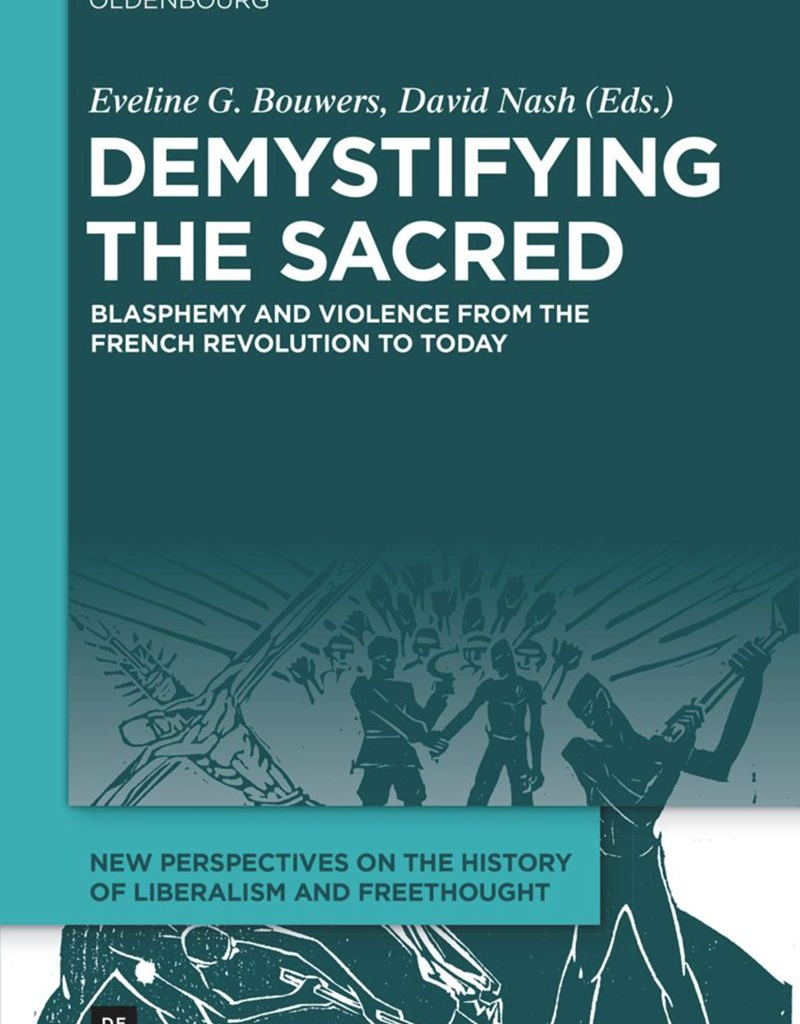

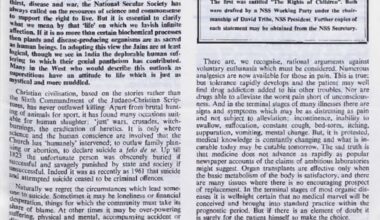
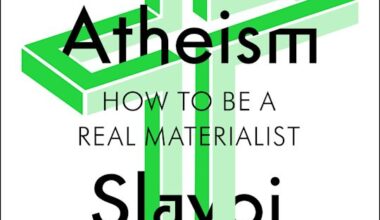

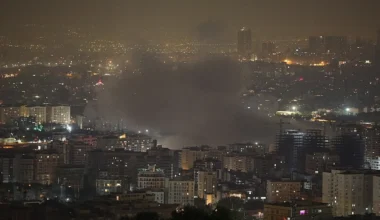

Your email address will not be published. Comments are subject to our Community Guidelines. Required fields are marked *
Donate